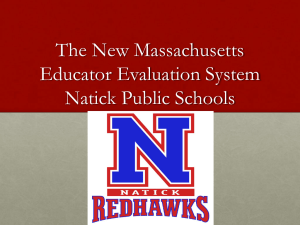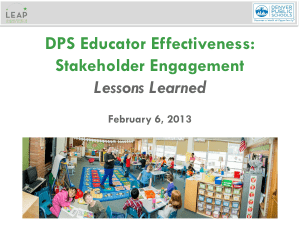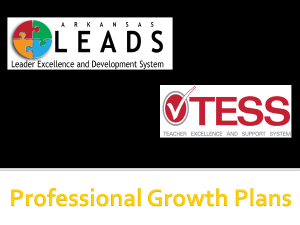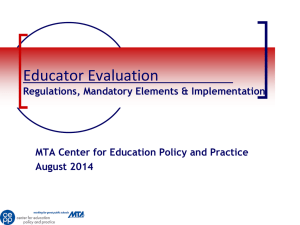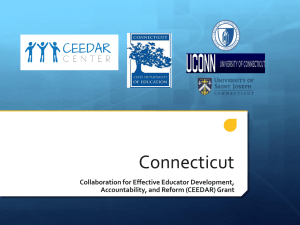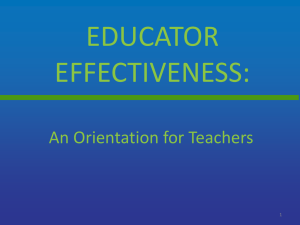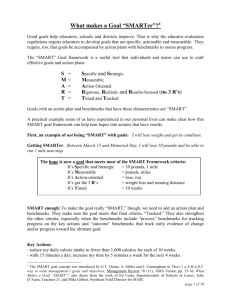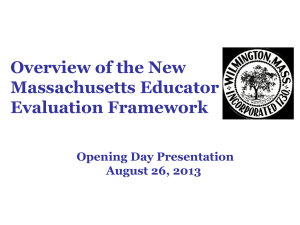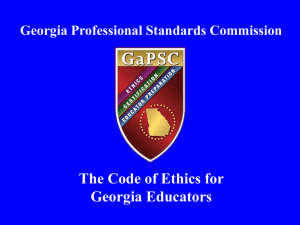SMART Goals and Educator Plan Development
advertisement
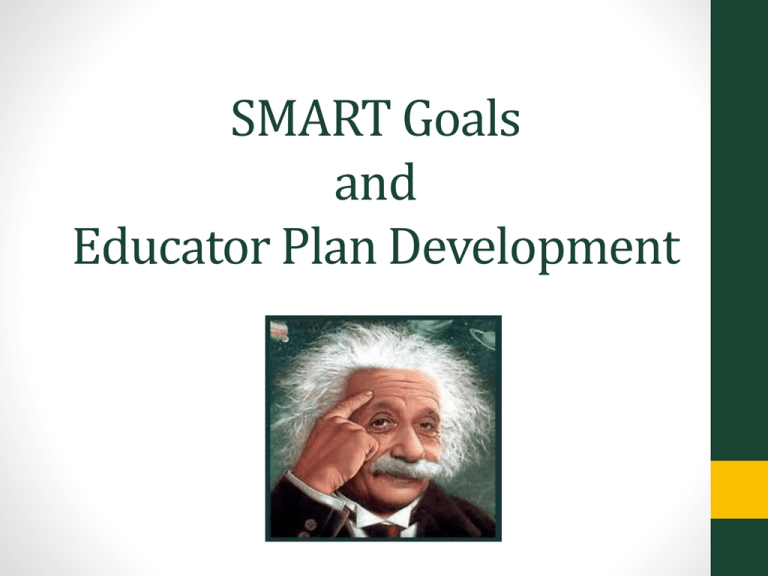
SMART Goals and Educator Plan Development 5 Step Cycle of Evaluation Goal Setting • Goal Setting for all educators with supervisor approval is required. • Goals may be set for individuals or for teams of educators by grade level, subject area, or job-alike. • School or district leaders must provide educators with information prior to goal development. Information Necessary for Goal Development • • • • • • District goals School goals Student performance data applicable to educator’s role Measures of student engagement and performance Measures of school climate Etc.. Two Goals Every educator will create two goals: • Professional Practice Goal • Student Performance and Outcomes Goal Educator Plan Development • Educator Plan is based on the two goals • Goals determine the types of professional activities, work products, and timelines that will comprise the Educator Plan. Evidence Collection • The educator keeps track of the work that is done to attain the plan’s goals and to document evidence of work toward the standards. • Think of this process as creating a portfolio, or learning log. • Logs might include activities under the following categories: professional development, parent/family engagement, professional responsibilities, community engagement Evaluation Software • Arlington is reviewing several web-based software programs and will choose one before the end of the year. • Educators will be able to upload documents and pictures in support of their goals to the website. Goal Setting Guidance Educators should consider the following when drafting their goals: • • • • • • • • Standards and indicators Self Assessment data School and district goals Student learning needs Educational challenges presented by the student population Personal goals for student learning Personal goals for improving professional practice Feedback from previous evaluations: formative assessments, formative evaluations, and summative evaluations Goal Setting Conference with Evaluator • Regulations require that team goals be considered • Team or individual meets with their supervisor • Educator/s and evaluator discuss and agree upon the two goals and begin to outline the professional development activities and the student learning activities to be incorporated into the Educator Plan Educators Plans All educators must have an Educator Plan Self-Directed Growth Plans: Most educators with PTS will be on a one or two year Self-Directed Growth Plan Directed Growth Plans: Educators with PTS whose overall practice is rated Needs Improvement must have an individual conference with the evaluator to define goals directly related to areas of underperformance. Improvement Plans: Educators with PTS whose overall practice is rated Unsatisfactory must have an individual conference with the evaluator to define goals directly related to areas of underperformance. Developing Educator Plan • In addition to any grade or subject level team meetings, a nonPTS teacher in his/her first year of practice shall have an individual conference with the evaluator to formulate the Developing Educator Plan. • The evaluator will assist the educator in developing goals. SMART Goals • SMART goals are not new for APS teachers. • These are the types of goals we have been developing for our CLT’s. • The following slides will review and, hopefully, improve your understanding of SMART goals. SMART Goals SPECIFIC – Goal has a well-defined target that gives clarity, direction, and focus. MEASURABLE – Concrete criteria for measuring progress toward attainment of the goal. ATTAINABLE – An attainable goal stretches the team in order to achieve it, but must not be extreme. RELEVANT – Goal relates to teaching, learning, leadership, parent engagement, and/or professional culture. TIME-BOUND – Goal to be achieved within a set time frame. SMART Goal Revision Template SMART Element SPECIFIC MEASURABLE ATTAINABLE RELEVANT TIME-BOUND Yes Partially No Suggested Revisions Questions to Ask Yourself Review the two-sided handout on pages 7 and 10: Practice Goal Guiding Questions, to help you decide if a proposed goal meets the criteria for a SMART goal. Sample Student Learning Goal Presenter Model: Sample Student Performance Goal #1 “Improving Student Performance through Writing and Thinking across the Curriculum by John Collins” (see handout page 8) Sample Student Learning Goal Presenter Model: Sample Student Performance Goal #2 “Over the next twelve months students will improve their scores for open response questions. They will use a rubric to guide their writing through the writing process. They will learn to score each other’s writing using rubrics.” (see handout page 11) Sample Student Learning Goal Now you try it! Sample Student Performance Goal #3 “Students will learn how to properly compose a response to an open response question using an introduction, detail (facts), paragraphs, and a conclusion.” Use the graphic organizer on page 12 to provide a rating and suggested revisions for this sample goal. Sample Professional Practice Goals Presenter Model: Sample Professional Practice Goal #1 “Over the course of the next 18 months we will develop and implement strategies to engage parents and families. We will evaluate our progress by the attendance of each event. Attendees at these events will sign their name and relation to the student.” Ideas: • certificates for perfect attendance • invite parents to as many events as possible • informational meetings with food served” (see handout page 9) Educator Plan Development What do Professional Practice Goals look like as part of an Educator Plan? How do educators create a plan around this goal? See sample Educator Plans on pages 15 and 16. Educator Plan Development What do Student Learning Goals look like as part of an educator plan? How do educators create a plan around this goal? See sample on page 18. Next Steps Educators fill out their own SMART goals for both Professional Practice and Student Learning Goals using MTA/DESE SMART Goal template. Review and discuss with a colleague. Educators fill out sample Educator Plan using MTA/DESE template. Review and discuss with a colleague. Evidence Collection
